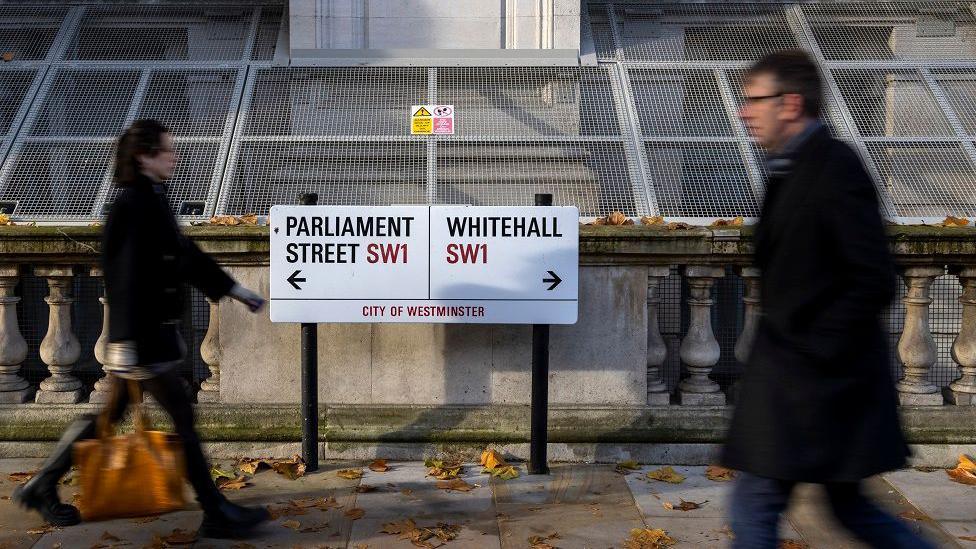Civil service interns must be working class, government says

- Published
The government will restrict civil service internships to students from poorer families as part of a drive from ministers to make Whitehall more working class.
The main internship scheme designed to attract university students to the civil service will now only be available for students from "lower socio-economic backgrounds", judged by what jobs their parents did when they were 14.
Those who are successful on the internship will then be prioritised for entry to the Fast Stream, the main graduate programme for entry to the civil service.
Conservative leader Kemi Badenoch said: "Under my leadership, a Conservative government would scrap all this rubbish and hire the best people."
The change has been driven by Pat McFadden, who as Chancellor of the Duchy of Lancaster is responsible for civil service reform.
He told the BBC: "We need to get more working class young people into the civil service so it harnesses the broadest range of talent and truly reflects the country.
"Government makes better decisions when it represents and understands the people we serve."
Currently around a quarter of higher education students are from a lower socio-economic background, but the group represented only 12% of successful applicants to the Fast Stream in 2024.
Some Labour ministers have come to believe in their first year in office that parts of the civil service are too privileged, with people who have come from similar backgrounds.
A summer internship programme already exists. The programme is for undergraduates in their final two years of university, lasts six to eight weeks and is paid, with a salary of £430 per week.
Under the scheme, which will open to applicants in October with the first cohort starting in summer 2026, the intake will be restricted only to students from poorer backgrounds.
The programme will give around 200 undergraduates experience of civil service work including planning events, writing briefings for ministers, shadowing senior civil servants and carrying out research for policy development.
Those deemed to have performed well will then be fast-tracked to the final stages of the Fast Stream selection process if they decide to apply to work in the civil service after graduation.
According to a survey carried out by polling company YouGov in 2024,, external 56% of British people identify as working class, 36% middle class and less than 1% as upper class.
The Social Mobility Commission, an independent body which advises the government on social mobility, has said a person's parental occupation is the most accurate measure available to assess someone's class.
It divides, external occupations into different categories including:
Professional and managerial occupations such as chief executive, doctor, engineer, teacher, nurse and journalist
Intermediate occupations which include jobs like driving instructor, IT engineer, shopkeeper and hotel manager
Working class occupations such as cleaner, waiter and bricklayer
The government is also trying to establish more career paths into the senior ranks of the civil service outside of London, announcing earlier this year that by 2030 half of the placements on the Fast Stream will be located outside of the capital.
The Labour government has been strikingly critical of some of the practices of the civil service since coming to office in July last year. In December, Sir Keir Starmer said that "too many people in Whitehall are comfortable in the tepid bath of managed decline," incurring criticism from civil service unions.
The prime minister has also said he wants to "rewire" the way the state works.
Conservative shadow cabinet office minister Mike Wood said the UK's public services "deserve talent chosen on ability".
In a statement Wood said: "We believe in opportunity based on what you can do, not where you come from.
"We all want to see greater opportunity for working-class young people. But this scheme sends the message that unless you fit a particular social profile, you're no longer welcome.
"No young person should be told they're not welcome based solely on leftist social engineering."
Dave Penman, general secretary of the FDA union which represents senior civil servants, welcomed the move noting that "the Social Mobility Commission found that only 18% of senior civil servants are from working-class backgrounds".
However, he added that "for people from disadvantaged backgrounds, even if you do manage to get into the civil service, you will not always get on" and said work needed to be done to support working class people into senior roles.
Head of the Social Mobility Foundation charity Sarah Atkinson said: "We're delighted by the government's decision to ringfence internship opportunities for students from lower-income backgrounds.
"While some organisations have already taken steps in this direction, it's encouraging to see the government leading by example."
Get in touch
Are you on a Civil Service internship or applying for one? Let us know what you think.
'Not enough space' for civil servants to return to office
- Published29 May
Thousands of civil servant jobs to leave London
- Published14 May

Sign up for our Politics Essential newsletter to keep up with the inner workings of Westminster and beyond.